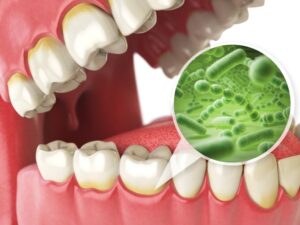
If the COVID-19 pandemic taught people anything about infection, it is that humans can infect others with some significant diseases in simple ways. You may find yourself washing your hands more often, coughing into your elbow, or wearing a mask if you feel a little under the weather to protect yourself and those around you. When it comes to other diseases, however, you may wonder whether they are transferable. For instance, is gingivitis, an oral condition, contagious? Can someone pass it to you with a sneeze or kiss? Learn more about gingivitis and find out!
What Is Gingivitis?
Gingivitis is the name of the first stage of gum disease, which is also called periodontal disease. This inflammatory infection comes from harmful oral bacteria that are allowed to remain in the mouth and produce acids that irritate the gum tissue. As a result, these usually pink and firm soft tissues appear red and swollen, and they bleed easily. If gum disease advances beyond gingivitis, it can eventually lead to tooth loss and irreversible damage to the oral cavity and jawbone.
Is Gingivitis Contagious?
Unfortunately, bacteria can be transferred from one surface to another, which suggests bacteria can be shared; however, most of the time, one person who has gingivitis cannot necessarily infect another person with just direct contact. Real infection results more from poor oral hygiene, but repeated and frequent contact with an infected mouth could increase exposure to gum disease. As a general rule, if you have kissed or shared a straw with someone who has gingivitis, you may be safe—as long as you continue with your own healthy oral habits.
How Is Gingivitis Treated?
Early on, gum disease is relatively easy to address. In fact, gingivitis can often be reversed through more thorough at-home brushing and flossing. When you do these hygiene tasks every day, bacteria-filled plaque has less opportunity to stick to your teeth and infect your gums. In addition to at-home hygiene, regular dental checkups and cleanings can keep any beginning signs of gum disease under control. More advanced cases require more intensive treatment to reign in the infection.
Can You Prevent Gingivitis?
Although about half of American adults over the age of 30 have advanced gum disease, it is not inevitable or unavoidable. The best approach for facing gum disease is to prevent it from happening in the first place. Thankfully, prevention doesn’t require much extra effort: you keep brushing and flossing daily, attending your routine checkups and cleanings, reduce the amount of sugar in your diet, and drink more water. These little habits can make sure that inflammation and bacteria don’t have a chance to disrupt your strong, beautiful smile.
Just as important as it is to wash your hands regularly to control spreading viruses, it’s important to keep your teeth and gums clean to reduce gingivitis and the later stages of gum disease. If you can catch and stop gum disease at gingivitis, you can maintain a healthy, complete smile.
About the Author
Dr. Stephen Boyles has nearly a decade of experience in dentistry so far, but even in this short time, he has achieved what most dentists do throughout their entire careers! He has mastership status with the Academy of General Dentistry, which means he has shown proficiency in almost every area of dentistry. Whether you simply have gingivitis or something more advanced, Dr. Boyles can help you regain your oral health. Schedule an appointment with him at Boyles General Dentistry & Dental Implant Center by visiting our website or calling us at 432-685-7011.
